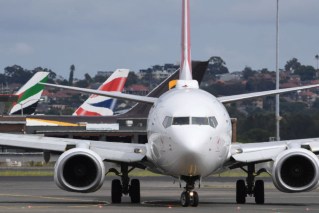Unruly air passengers put on notice


A Scoot flight was forced to turn back, and a man had to be physically restrained, after a brawl broke out mid-flight. Photo: Channel Nine
Passengers are smoking, drinking and generally playing up on more flights, prompting an overhaul to the global standards for passenger behaviour.
From January 1, the Montreal Protocol 2014 becomes enforceable – a treaty that boosts powers to prosecute disruptive passengers.
It’s something the International Air Transport Association (IATA) has been pushing for about five years, in a bid to make flying safer and more enjoyable for passengers and crew alike.
The association’s CEO Alexandre de Juniac said about 60 per cent of passengers who behave badly on flights escape punishment, because of a lack of enforced guidelines.
The previous guidelines made for grey areas on international flights – offences could only be prosecuted in the state (country) where the aircraft was registered.
So if a passenger whose behaviour warrants a slap on the wrist lands in a country different to the airline’s origin, finding a foothold for prosecution can be tricky.
So far, 22 countries have signed the treaty (Australia hasn’t) – but IATA has called on more countries to get onboard.
- Related story: Jetstar bans unruly passengers
“(The protocol) strengthens the deterrent to unruly behaviour by enabling prosecution in the state where the aircraft lands. The treaty is in force. But the job is not done,” Mr de Juniac said in a statement.
“We encourage more states to ratify (the protocol) so that unruly passengers can be prosecuted according to uniform global guidelines.”
While Australia hasn’t signed up yet, there is existing federal legislation that can deal with bad behaviour.
Punishment can stretch as far as a 10-year jail term, fines and flight bans.
Not good flyers
As more people fly, more people cause a ruckus onboard.
IATA’s data showed the rate of unruly passengers increased from 2016 to 2017.
IATA ranks passenger behaviour on four levels, from minor to moderate to serious to flight deck breach.
Eighty six per cent of the behaviours reported in 2017 fell into the minor category – 49 per cent were passengers failing to abide to safety regulations, 24 per cent were for lighting up a cigarette onboard, and 27 per cent were for excess alcohol consumption, which spiked in summer and on routes to popular holiday locales.
Cause for investigation
The prevalence of unruly passengers caused the Australian Institute of Criminology to not only sit up and take notice, but to hold a roundtable discussion in 2015.
It brought together airline representatives, police and aviation industry bodies to nut out just how widespread the problem was, and what to do about it.
One airline representative said their company dealt with about 30 instances a month.
- Related story: Singapore flight turned back after on-board fight
It was mostly agreed upon that there wasn’t a ‘typical’ profile of an unruly passenger, but most incidents ticked at least one of the following boxes:
- The passenger was a male aged between 18 and 35
- They were on their way to a ‘partying’ holiday destination, or a sporting or entertainment event
- Were part of a hen’s or buck’s party, or a sporting team trip
- Or were a fly-in, fly-out mine worker travelling in a group.
The report noted that since airlines allowed the in-flight use (in flight mode, of course) of smartphones, tablets or other personal electronic devices, the rate of unruly behaviour dropped.
However, the introduction of self-serve check-in kiosks meant airline staff didn’t have as much interaction with passengers before they boarded their flight, meaning they could miss the chance to identify a frustrated passenger, or someone who’d decided to pre-game a little too hard for their journey.
In conclusion, the roundtable reached a range of actions that could lessen the rate of unruly behaviour.
You can read the full report here.











